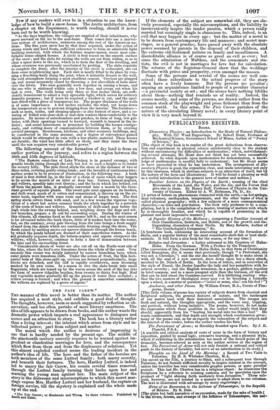THE FAIR CAREW. * THE manner of this novel is better
than its matter. The author has acquired a neat style, and exhibits a good deal of thought. The thoughts, however, seem as much suggested by reflection as ob- servation, and too often partake of mere literary smartness. The idea of life appears to be drawn from books, and the author wants the dramatic power which imparts a real appearance to dialogues and scenes and an attraction to story. The book has a literary rather than a living interest; the interest which arises from style and in- tellectual power, -.part from subject and matter.
The moral whioh the author is desirous of impressing is one that is hardly needed by the present age. The middle of the nineteenth century scarcely requires to be warned against im- prudent or clandestine marriages for love, and the consequences which flow from them and from the displeasure of relations. Yet this almost exploded conduct seems the leading incident in the author's idea of life. The hero and the father of the heroine are both members of the same Luttrel family ; both marry secretly, and beneath their fortunes. The hero, Hartley Luttrel, is indeed led to marry the fair Carew, his cousin several times removed, through the Luttrel family turning their backs upon her and Warning the young man against her. The main subject of the story is the distresses and misconceptions to which this secret mar- riage expose Mrs. Hartley Luttrel and her husband, the captain on foreign service, till the mystery is explained and the whole made up at the end.
smilihme IagdCarew; or Husbands and Wives. In three volumes. Published by If the elements of the subject are somewhat old, they are cle- verly presented, especially the misconceptions, and the liability to. inconveniently inspire the tender passion, which a person really married but seemingly single is obnoxious to. This, indeed, is an evil that may happen in every age ; but the matter of a novel is to be drawn from contemporary life and manners; and secret mar- riages, as a general practice, have passed away with the absolute power assumed by parents in the disposal of their children, and the extreme old-fashioned notions on family and mesalliances. A discreditable alliance is of course as great an evil as ever ; but since the admiration of Malthus, and the economists and sta- tists, the evil is not in marriages for love but for calculation. The returns of the Registrar-General show that the weddings fluctuate with prices and prosperity, even amongst the masses. Some of the persons and several of the scenes are well con- ceived: those subordinate to the actual progress of the story, often have a lively humour. But the persons are peculiar ; arguing an acquaintance limited to people of a peculiar character —a provincial society or set ; and the scenes have nothing lifelike about them—nothing that reminds us of reality. Indeed, the scenes mostly, and some of the persons, are drawn rather from the common stock of the playwright and prose fictionist than from the actual world. In this sense, The Fair Carew partakes of the nature of the circulating library novel; in every literary point of view it is very much beyond it.


























 Previous page
Previous page